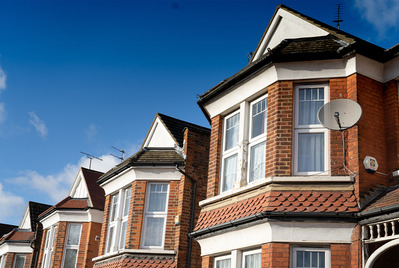
Up and down the UK, landlords and tenants are feeling the pinch of the cost of living crisis. Inflation is predicted to hit 10% this year and people’s take-home pay just isn’t going as far as it used to.
As everything - from the weekly shop and energy bills to fuel and labour costs - becomes more expensive, it’s those on lower incomes that are suffering most. But with inflation rising faster than wage growth for the vast majority of people, even higher earners are seeing the value of their income dropping.
Inflation is currently at 9% and rising1 - way above the Government’s target of 2%. But what’s caused the cost of living to rise so dramatically? Here are some of the key factors:
- Pandemic-related restrictions on movement and work absences had a huge impact on the global supply of goods and services. As demand shot up for certain things during lockdowns and then again once lockdowns eased, the supply chain simply couldn’t keep up, forcing price rises
- Post-pandemic demand on goods has overwhelmed shipping companies worldwide, so retailers have had to pay a lot more to get goods into their stores
- Current lockdowns in Asia are impacting the import of goods to the UK
- Russia’s invasion of Ukraine has led to food and energy supply issues
- UK wage increases and higher National Insurance Contributions have forced up the cost of goods and services
- Global oil and gas prices have risen sharply, so fuel costs have been spiralling this year. And the raising of the energy cap in April means everyone has seen their energy bills shoot up
What’s likely to happen in the next couple of years?
Both landlords and tenants can expect finances to be tight through 2022 and 2023. As everyone has to spend more of their disposable income on energy bills, fuel costs, food and general living, many tenants are going to find it harder to afford their rent.
For landlords who can’t raise rents in line with inflation, finances could be hit in two ways:
- The increasing cost of property maintenance and repairs may reduce net profits
- Rental profits could be worth less in real terms
Although the next couple of years might be tough, the positive news on the horizon is that the Bank of England expects inflation to fall in 2023 and drop back to close to 2% in around two years. That’s because they believe the main causes of current inflation won’t last long.
In the meantime, here are three top tips to help make sure your rental business emerges from the cost of living crisis in good shape:
1. Check your costs
With prices rising so quickly, it’s worth checking and reviewing your expenditure every month or so. Keep a careful record of (a) what’s going out each month and (b) the price of other periodical costs.
We know prices are going to keep going up for the foreseeable future, so try to plan ahead. Even if you can’t make any savings right now, you might be able to agree some deals to fix things like contractor and service rates for the next 12 months or so.
If you haven’t reviewed your mortgage recently and your current deal is coming to an end any time within the next two years, it’s worth speaking to a mortgage adviser now. Monthly buy to let mortgage payments are likely to be one of your biggest costs, and interest rates are currently climbing due to the Bank of England base rate increasing.
The base rate has already risen from 0.1% to 1% over the past five months and some are predicting it will go up by at least another whole percentage point in the next year. So it may be worth switching your mortgage product sooner rather than later.
If you would like to review your mortgage, we work with Embrace Financial Services who can access thousands of mortgage products instantly and help you understand whether you are on the most suitable rate now and in the future.
YOUR PROPERTY MAY BE REPOSSESSED IF YOU DO NOT KEEP UP REPAYMENTS ON YOUR MORTGAGE.
Embrace Financial Services usually charges a fee for mortgage advice. The precise amount of the fee will depend upon your circumstances but will range from £499 to £999 and this will be discussed and agreed with you at the earliest opportunity.
2. Check utilities
As energy costs continue to head upwards, this may be a major concern for both you and your tenants. So it’s worth looking at what you can do to keep your bills under control.
Firstly, shop around to make sure you’re on a good deal. Then, if you don’t already have a smart gas and/or electricity meter installed, it’s well worth getting one as soon as possible as it can really help you keep utility costs under control.
The key benefits:
- The portable in-home display device communicates wirelessly with your meter, so you can put it in a convenient spot
- It shows your usage in near-real time, so you can see which appliances and activities are using the most energy, and where you might be able to make savings
- Readings are sent automatically to the energy supplier at least once a month, so you get accurate bills instead of rough estimates
- Prepay accounts can easily be topped up via an app, phone or text, reducing the chance of running out of credit
It’s the bill payer who has to request the switch, so if your tenants pay their own utility bills, direct them to the Smart Energy GB website and encourage them to contact their supplier – there are no upfront costs to switch.
3. Invest in your property
Although you might be tempted to cut back on maintenance and repairs and put off making any upgrades for the foreseeable future, that could be a false economy. Here’s why it’s worth investing in your property:
- You have a legal obligation to keep your tenants’ home in good condition
- Maintaining the property well and making upgrades when things start looking a little tired will encourage good tenants to stay
- If your tenants move out, you need to be able to re-let quickly at a good price
- Regular repairs and renovations help protect and can potentially improve the capital value of your investment
So think of this kind of expenditure as an investment, rather than a cost. And remember that tax-wise, the cost of repairs and replacements can be deducted from income on your annual return, and whatever you spend on capital improvements can be offset against any capital gains when you sell!
If you’d like any advice on maximising your profits over the coming months, or where it’s worth spending money on your rental property, we’re here to help. Just get in touch with your local Your Move branch and speak to one of the team.
Source:
1 https://moneytothemasses.com/owning-a-home/interest-rate-forecasts/latest-interest-rate-predictions-when-will-rates-rise
2 https://www.bankofengland.co.uk/knowledgebank/what-is-inflation
The Your Move Content Marketing Team



